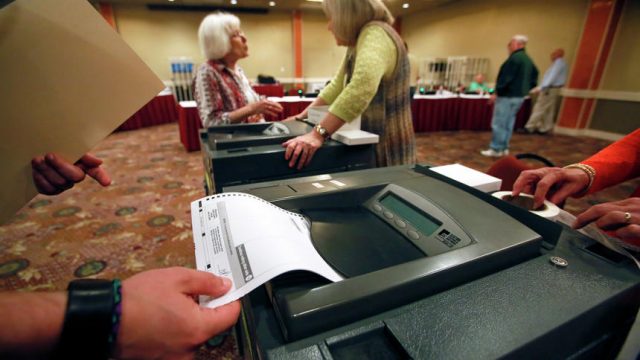UND Political Science Professor: Republicans Using Voter ID Laws to Suppress Votes Because Heidi Heitkamp Won in 2012

Voters cast their ballots June 6, 2016, at the Baymont Inn in south Fargo during early voting for the state primary. Forum file photo
North Dakota Democrats are promoting a recent article in The Nation, a far-left organization which exists to promote progressive causes, which is built around the idea that Republican policymakers in our state have been pushing voter ID laws in order to suppress votes.
But the only evidence for this thesis is, supposedly, the timing. According to University of North Dakota political science professor Mark Jendrysik – whose wife, Kiara Kraus-Parr, was on the ballot as a Democrat during the 2014 cycle, something The Nation didn’t bother to mention – Republicans sought new laws to suppress votes because they were angry about Senator Heidi Heitkamp’s narrow victory over Republican Rick Berg in 2012:
To Mark Jendrysik, a political scientist at the University of North Dakota, it is clear the effort was part of a concerted partisan move to stifle Democratic-leaning constituencies. “It was designed, in my view, to stop students from voting and making it difficult for Native Americans to vote, I think purposefully,” he said. “It suddenly became important after Heitkamp won. I don’t think it takes a genius to put two and two together.”
You’d think an academic like Jenrdysik might understand that correlation is not causation.
Which isn’t to say that the 2012 election wasn’t the impetus for voter ID reform efforts in North Dakota. It was. Just not for the overtly partisan reason Jendrysik suggests.
What we saw in 2012 was a dramatic increase in the use of affidavits to circumvent the state’s voter ID requirements. The law at the time allowed voters without qualifying identification to cast a ballot anyway, which was counted, simply by signing an affidavit. Affidavits which are pretty much impossible to verify in any sort of a timely fashion.
So much of this happened in 2012 that it could well have swung the Senate election. This is an excerpt from a filing made by Attorney General Wayne Stenehjem in the lawsuit challenging changes to state law removing the affidavits as an option to cast ballots (read the whole thing here), and in it the state points out that so many affidavits were used in 2012 that the Senate election outcome “could not be verified.”
Further along in the filing we find out that in the 2016 election there were no fewer than 18 legislative races where ballots cast by way of affidavit could have swung the outcome:
We can debate the merits of these arguments. Perhaps you are not as concerned as I am about the potential for fraud in the use of these affidavits.
That’s beside the point. The conclusion our friends on the left would like promote is that the state’s voter ID laws were an act against the voting rights of left-leaning constituencies. Except that’s not true. The effort to reform the state’s voter ID laws was born of very real concerns over the potential for voter fraud.
I should point out that the courts have now largely upheld the state’s voter ID laws. The most recent ruling allowed the state to stop accepting affidavits, though election officials are required to accept an expanded set of identification and cannot require that ID has a physical address.
The matter is still being litigated:
As expected, state of ND filed a motion for a stay pending an appeal in the voter ID case. Filed yesterday afternoon in Eighth Circuit #ndpol https://t.co/2xyBcvPEXt
— John Hageman (@jhageman_) May 3, 2018
As for the impact of these law changes on our ability to exercise our franchise at the ballot box, I should point out that voter turnout has remained relatively unchanged in the state. In the 2012 election year turnout was 61.16 percent. In 2016 it was 61.29 percent.
If there’s voter suppression going on, nobody seems to have told North Dakota voters about it.






